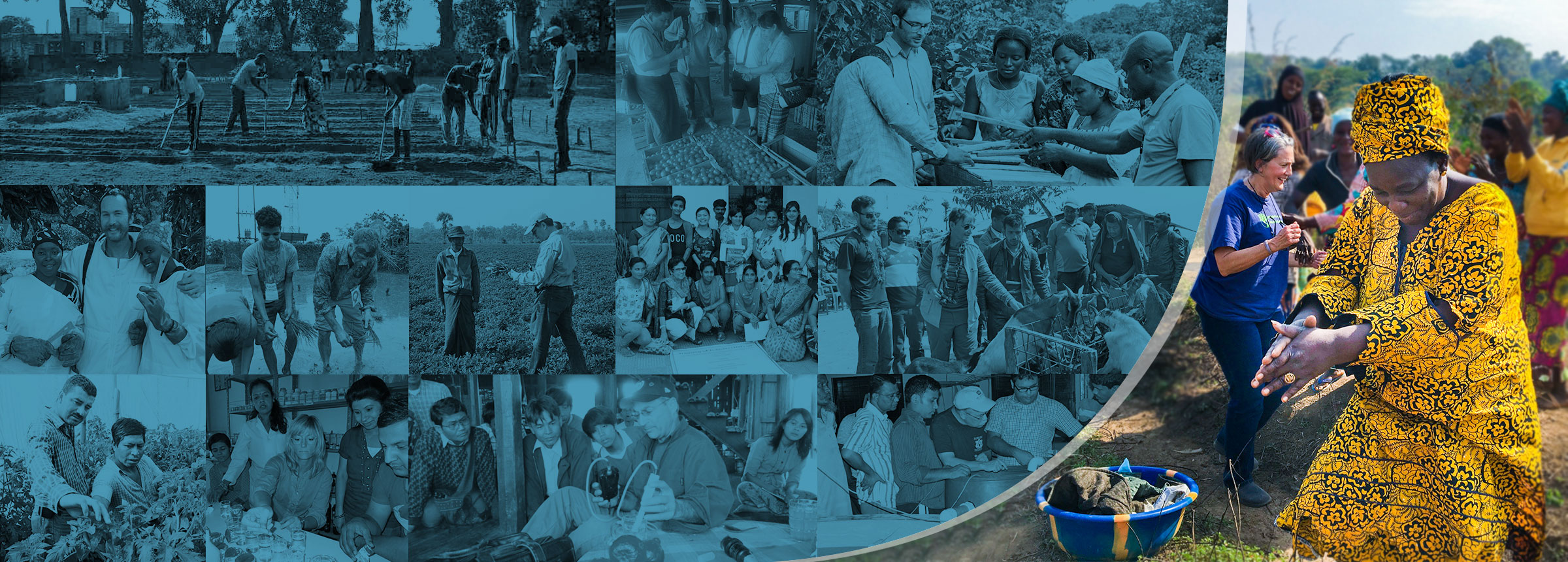
Volunteer Post
Celebrating 30 Years of F2F: Field staff perspectives
The Farmer-to-Farmer field staff are the core of the program, working tirelessly to deliver quality technical assistance to local host organizations and take good care of each volunteer that sets foot in their country. Without them, the program could not succeed.
In today’s blog post, three Winrock F2F field staff reflect on their experience with the program. Be prepared to be inspired!
F2F Nigeria Country Director, Mike Bassey:
“Meeting and working with F2F volunteers has been the best privilege I have enjoyed so far. In my nearly five years with the Farmer-to-Farmer program, I have met, spoken to, shaken hands, and travelled, eaten, and shared laughter and memorable experiences with over 100 F2F volunteers from nearly every state of the United States. Never in my entire life have I met people from such diverse backgrounds yet so homogeneously down to earth, sincere, and with a strong passion to help.
One memorable experience was with Dr. Mathew Baker, a professor of Agricultural Education and Communications at Texas Tech University in Lubbock, Texas. During Dr. Baker’s assignments, apart from discussing the assignment during our routine evening walks, we also discussed leadership issues, among other things. He provided a lot of insights into the many leadership topics; most of which I have found very useful. This friendship has been so strong that Baker and his family lodged me for four days in their home in Lubbock and hosted friends and colleagues to a dinner in my honor during my visit to the US in the fall of 2014. This is particularly important to me because it came at a time when no one would go near a Nigerian because of the Ebola epidemic ravaging a number countries in the west African region at the time.
The summary of my experience with the F2F program over the years is that, for one: the volunteers are ever willing to learn, adaptable to the people and their cultures, and ever ready to give their best. As a program, F2F has removed the dichotomy created by colonialism between the elite scholar and the poor peasant farmer. It has taught leaders to have a listening ear for the followers.”
F2F Nepal Assistant Country Manager and M&E Specialist, Chhan B. Bhattachan:
“The day that I joined F2F program in January 2014 seems like yesterday. Since then, I have experienced many memorable moments working with volunteers, hosts and project activities.
I remember a full class of 70, attended by mostly female students, at Uttarpani Technical School during volunteer Anil Shrestha’s presentation on food security issues and farming practices in US. The participants (not only the students but also faculty members) were so attentive. It was great exposure for them.
During the F2F assignment on youth facilitation and entrepreneurial skills development withvolunteer Jeremy Elliot-Angel, the last day of training was very hectic, as the trainees waited to be elected as the ‘best entrepreneur team.’ The day was allocated for teams to prepare business concepts, including a mission, company slogan, promotion strategy, and a minute of television advertisement enacted by all members of the team. The eight different groups prepared their business ideas and television advertisements. Each team was given five minutes to present their business concept, and the remaining groups asked questions and gave feedback. After all groups finished their presentations, each business was judged by individual members. That really was an entrepreneurial election!
From volunteer James Faber, I learned why and how shifting people’s paradigm is crucial.
I am enjoying collecting and documenting achievements from the program, as well as working with diverse host organizations, highly experienced volunteers, and a motivated team!”
Ricardo Auerbach, F2F El Salvador Country Director from 2003-2013:
“99% of my experiences with F2F are memorable! I learned a lot from so many diverse topics that we trained farmers; we traveled around the whole country and other parts of the Central American region to support farmers and bring innovative but applicable ideas to improve their family incomes. And we could share our culture with American volunteers that enjoyed their time in country, living nice relaxing moments after long days of work.
This means that one blog entry could not be enough to highlight our great moments implementing F2F!
I will choose one subsector as an example: Dairy. Between 2003-2013, nearly 40 F2F volunteers introduced food quality and safety standards to 12 dairy processors, which, in turn, modernized their facilities and increased their sales by producing higher quality cheese. Representing more than six thousand farmers, their sales are now more than 9 million dollars.
I’m proud to have been part of the USAID F2F program for ten years! It was a ‘school’ for me, not just to learn scientific and technical concepts, but to develop friendships with American volunteers, local partners, and farmers. My huge lesson learned is that sustainable rural development is like a puzzle. I learned to identify the weak links in the value chain and find the correct puzzle pieces to engage it, and after a while, look for the complete picture.“
